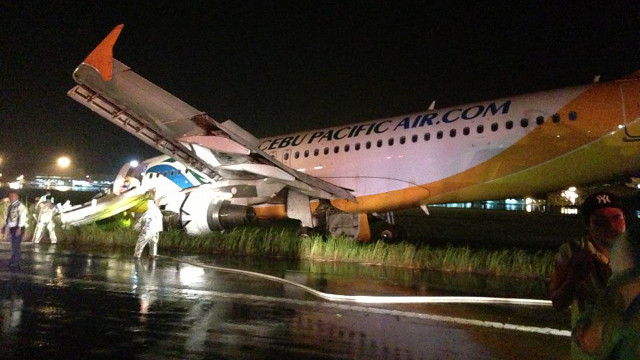SUMMARY
This is AI generated summarization, which may have errors. For context, always refer to the full article.

MANILA, Philippines – The president and CEO of budget carrier Cebu Pacific Air apologized to all those affected by its aircraft that halted operations in Davao international airport, the country’s 3rd busiest gateway.
“This incident is most unfortunate. I would like to personally apologize to all the passengers affected and those whose travel plans were disrupted,” Lance Gokongwei said in an ANC interview on Monday night, June 3, a day after its A320-200 plane carrying 165 passengers from Manila overshot the Davao airport runway amid bad weather.
He said the airline has a “specialist team” in Davao airport to help extricate the stranded plane, which has caused the cancellation or re-routing of about 40 flights, affecting hundreds of passengers.
State aviation officials initially targeted to resume operations in Davao airport by 8pm Monday, but weather-related issues prompted the Civil Aviation Authority of the Philippines (CAAP) to move the deadline to 7am Tuesday, June 4.
“We have a team of people in Davao working throughout the night. We are currently working closely with CAAP,” Gokongwei said.
Not an emergency
Gokongwei also stresed that the Davao incident did not involve “an emergency situation.”
“There was no emergency situation…It was a precautionary disembarkation,” he said, addressing a question on the length of time it took to deplane the passengers.
Affected passengers took to social media to complain about how it took Cebu Pacific flght crew all but 30 minutes to deplane them. This also prompted the president of Ateneo de Davao to write a scathing letter about how Cebu Pacific treated the passengers.
“The important thing is that all passengers disembarked safely,” Gokongwei added.
He said the pilots and cabin crew followed the industry’s standard operating practice. “Our crew onboard followed the protocol… I would like to congratulate the professionalism of our crew on board with all passengers safe,” he said.
He said that if the protocol for emergency evacuation occurred, there would have been “further injury.”
He said that the pilot had been in contact with the Davao airport tower when the plane was about 500 feet from the airport and before starting the landing procedures. Upon touchdown, the aircraft skidded off the paved runway.
He said the pilots immediately shut down the aircraft engine, then the crew waited for the ground personnel to arrive to fetch the passengers. Only then were the “forward emergency slides” opened to let the passengers out.
“You have to understand that this happened during heavy downpour,” he stressed.
Earlier, an aviation expert commented that bad weather is not a reason for not following industry standard operating procedures, which include immediately evacuating the passengers in any aircraft-related incident.
“When an aircraft lands where it is not supposed to be, the pilot calls for an immediate evacuation and the cabin crew must immediately open the doors and put out the slides as quick as possible,” Benjamin Solis, a retired Philippine Airlines (PAL) pilot who has been helping airport authorities in Clark, India, and others meet global standards.
‘Insensitivity, ineptness’
Most of the passengers complained about having to walk almost a kilometer just to reach the arrival section of the airport without any personnel from Cebu Pacific offering assistance or even comfort, one passenger commented.
Ateneo de Davao University President Fr. Joel E. Tabora accused the airline’s personnel of “insensitivity and ineptness” in dealing with the airline passengers. “It was only after 27 minutes in a smoked cabin that the passengers were allowed to leave the plane by coming down emergency slides,” he wrote.
Tabora said the university is boycotting Cebu Pacific — the country’s biggest domestic airline operator.
“In this situation we may not have handled all issues perfectly, but we can learn from this experience,” Gokongwei said.
“We have to find out more and we’ll try to get in touch with all our disrupted passengers,” he said.
He said that among the information they are still confirming is whether the airport runway lights were shut after their aircraft crash landed.
Disruption
Cebu Pacific re-routed its 20 Davao flights to General Santos, which is at least two hours away. It mounted extra flights to accommodate passengers flying both Davao and General Santos routes.
PAL and its unit PAL Express also re-routed their Davao flights to General Santos. It used bigger aircraft instead of their standard-sized planes to accommodate the affected passengers.
Passengers of other airlines remain stranded in Davao.
READ: Airlines deal with Davao airport closure
READ: 6 rights you have as an airline passenger
The local airlines are providing free land transport between Davao and General Santos, food and drinks, and are waiving rebooking fees. – Rappler.com
Related Stories:
Add a comment
How does this make you feel?
There are no comments yet. Add your comment to start the conversation.